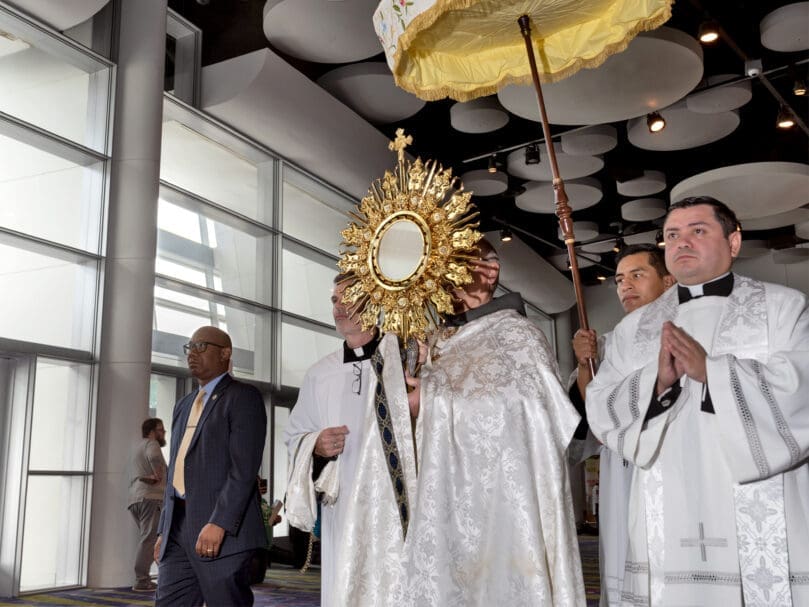 Photo by Johnathon Kelso
Photo by Johnathon KelsoThe Eucharist, the sacrament of love
By YOLANDA MUNOZ | Published January 29, 2023 | En Español
In the Greek language, there are three different words for love, describing three types of love. Philia, Eros, and Agape.

Yolanda Munoz
Philia love is the kind of love that we have for our brothers and sisters. It is the kind of love that we have for a friend. It is calming, soothing and fulfilling. Philia love tells you, “I am here for you.” Eros is romantic love. It is passionate and full of strong emotions. We can do seemingly crazy things in passionate love. Eros love tells you, “I desire you.” Agape is self-giving love, when we give all to the beloved, when we do not think about ourselves anymore. Our primary focus is on the wellbeing of the person we love. Agape love tells you, “I will die for you.”
All these aspects of love are connected, as our late Pope Benedict XVI taught in his first encyclical letter “God is Love,” especially reflecting on the relationship between eros and agape and how both are needed in the Christian life.
God, who is love, loves us perfectly in all these ways. He is the perfect friend that walks with us and has our back. He is the lover, full of passion, who will do any crazy thing to get our attention. He is also that perfect love who gave his life for us on the cross. In his perfect plan of love, God wants to be present with us. We are body and soul, and the body needs something that it can touch, see, and feel; so, the Lord gave us the Eucharist. Jesus is completely present—body, blood, soul and divinity—in the Blessed Sacrament of the altar.
There are many reasons why he gave us himself in the Eucharist:
The Eucharist is a gift of love. When we love somebody, we feel the need to give. We give flowers, chocolate, and anything we think the person we love is going to like. Jesus gives us himself.
Christ present in the Eucharist accompanies us. He wants to be here for us and keep us company. He wants to listen to our problems, and share in our joys. He wants to walk with us to carry us in the moments when we do not have the strength to walk.
The Eucharist feeds us. It is the bread of life that strengthens us when we face temptations.
The Eucharist changes us. Remember the saying that we are what we eat. We become more like Jesus when we receive the Eucharist worthily.
The Eucharist heals us. We are wounded by sin, either ours or others’, and by other sufferings we experience. We carry our wounds and tend to hide them in places where nobody can see them, not even us. Jesus in the Eucharist can reach all those places and help us heal and unite ourselves with him.
“I have set before you life and death, the blessing and the curse. Choose life, then, that you and your descendants may live” (Dt 30:19). When presented with this love we have two choices—we can reject him or love him back. The Lord gave us free will and he is gentle. He will not force us. It is up to us.
In the Eucharist we can find that intimate encounter with God in our Lord Jesus Christ who heals, nourishes, strengthens, and loves us.
This love has sustained me in my journey, and it continues to open up more room for me to grow in love. May this Eucharistic Revival be an opportunity for all of us to grow in love of this great sacrament of love and share that love with others.
Yolanda Munoz is associate director of the Office for Divine Worship and is a member of the archdiocesan Eucharistic Revival Task Force.